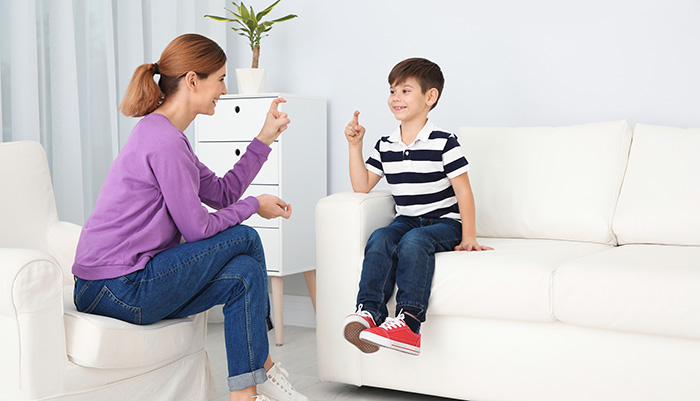
To be told that your child is deaf or has significant hearing loss can be devastating news for a parent to handle. And there’s a whole range of emotions that you may experience – from shock, disbelief and grief to anger, guilt and fear. Even the other members of your family can respond in many different ways, some even unexpected.
A Few Parents With A Similar Story
There are many, many other parents out there who have had similar struggles and have found a way to move forward. Sharing your experiences with them can help you come to terms with your situation, and let your child meet other children with hearing troubles.
Here’s what a few parents felt when they first learnt that their child can’t hear normally. Hear it in their own words.
- ‘For me, the hardest part in the beginning was fear of the unknown.’
- ‘For months, we knew something was wrong. When her hearing loss was finally diagnosed, I felt such a sense of relief. That might sound odd, but I was so relieved because despite what her doctor and my friends and family had been telling me, I knew something was wrong. Finally getting a diagnosis meant that we had a place to start. We knew what we were dealing with, and now we could begin to educate ourselves and try to figure out the next step.’
- ‘I cannot remember anything they said after the word ‘deaf.’ I had to call the doctor’s office later and ask for all the details over again.’
- ‘I was surprised to learn she was hard of hearing, and I felt guilty about the possible causes. I was devastated and shocked.’
- ‘I remember only being able to go home. I wasn’t able to get on with the normal daily activity. I just had to be at home. I was shattered. The first week I cried a lot, and desperately wanted to do everything in my power to help her hear!’
- ‘At first, I would wake up in the morning, and then I would suddenly remember. “Oh yeah, he’s deaf.” And I would feel sick. I still remember that feeling, although it did not last long.’
Allow Time For Things To Sink In
You’ll find yourself plagued endlessly by questions about how he or she will do smallest of things like making friends or studying or finding a job or a partner.
The first step is to let yourself believe that you are doing your best to make sense of what has happened and to accept the situation. Being equipped with knowledge about the condition and the options available to your child is also important for you to be able to move forward.
But that comes later. First, just let it all sink in.
Continue To Have Dreams And Ambitions For Your Child
Every parent has dreams and ambitions for what their child will grow up to be. After the diagnosis, it’s normal for you to worry if your child will enjoy the same opportunities as other kids. But it’s important that you continue to have dreams and ambitions for your child so that you’re able to do your best and expect their best from them every step of this seemingly-long journey to their leading a full life.
Here’s How You Can Support The Child At Home

It’s important for everyone in the family to remember and adjust to the fact that even with assistance in hearing, your child remains hearing impaired. And it’s important when raising a child with hearing loss is to encourage them to take responsibility for their hearing loss, to motivate them to wear their hearing gear. Help them understand why they wear them, and how they help them hear.
Do things that will make your child feel relaxed and confident. Accept your child the way he is and encourage and praise them when they do something well. It’s important to pay attention every time they want to share something with you, even if it’s a small thing. It’s important to reassure them and make them feel involved in things so that they don’t feel left out of the hearing world.
Apart from giving them love and encouragement, it is vital to raise your child like any other hearing child. Give them responsibilities, just like you would give to their siblings and give them the freedom to do things that don’t involve you. If your child with hearing loss is older than your hearing child, make sure the younger child is not given the role of the older and more responsible sibling just because he can hear normally. It’s also important not to inadvertently let your hearing child assume the role of an interpreter – like calling out to your hearing child and asking him to get his hearing-impaired sibling along, for instance. Subtle, but important things to keep in mind.
All these are big steps towards preparing them for the real world and not let their physical impairment come in the way of their becoming strong, self-reliant adults.
Seek Support: Involve Grandparents And Siblings

This isn’t a battle you can win alone. You will need as many allies with you as you can get. And remember, there are others similarly impacted by the news of the diagnosis and want to help in every way they can.
Involve the child’s grandparents gently explaining that their age-related hearing loss isn’t same as your child’s and cannot be compared. You will also need to guide them into being positive and supportive with your child without treating him differently than their other grandchildren.
Having a brother or sister with hearing loss greatly impacts your other kids. It’s important not to overlook them in the process. Educate them about hearing loss and how their sibling copes with it and how they can help. You might need to sort out the occasional emotional outburst when they find themselves losing patience with their sibling with hearing loss. You can also teach them how to respond to their friends not-so-polite comments about your child’s condition.
And most importantly, remember to take time out for yourself. Raising children is a tiring job after all!









